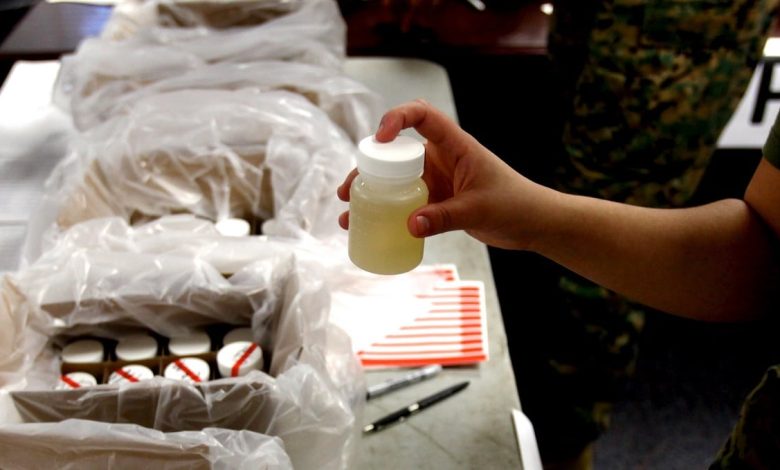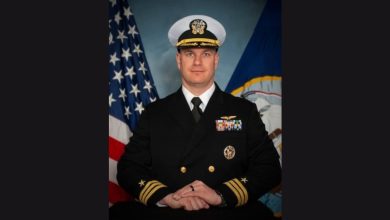Piss poor: Inside the ‘sloppy’ practices of a military urinalysis lab

A Marine Corps gunnery sergeant and Afghanistan war hero saw his drug conviction overturned this fall by the Navy and Marine Corps Court of Criminal Appeals.
Gunnery Sgt. Rory R. Hirst’s conviction was based on a urine sample that tested positive for an illegal drug.
But during the course of the appeals process, the case against Hirst revealed troubling shortfalls in how at least one urinalysis lab handled samples of service members being tested for drugs.
A positive drug test result is a career killer for service members, and can lead to a federal conviction, confinement and a dishonorable discharge.
Given the stakes, precision is a must in such settings, and Hirst’s court records raise questions about how at least one such lab is being run.
“The Sailors and Marines who face the devastating consequences of a criminal conviction while being afforded diminished constitutional protections should expect, and this Court will require, substantial compliance with the Department of the Navy’s urinalysis program,” appeal judge Navy Capt. Brian Mizer wrote in the ruling overturning Hirst’s conviction.
“That did not happen here.”
The gunny pleaded not guilty at trial in April 2022 and was initially convicted, reduced in rank to sergeant and sentenced to 90 days in the brig.
RELATED
That conviction was based on a purported positive test for the illegal drug MDMA that happened following the July 4th holiday in 2021.
A lab doctor testified that the drug level found in Hirst’s urine “was so low that he may not have felt the effects of the drug,” and given that low level, the doctor was unable to say whether Hirst’s alleged use of the drug was wrongful, according to the appeal court ruling.
In the September appeal court’s overturning of the conviction, Mizer recounted the recurring, widespread and shoddy practices of the Navy urinalysis lab at Great Lakes, Illinois, that handled Hirst’s sample.
The Marine staff sergeant who oversaw the urine sample processing at the time, referred to in court records only as “SSgt. D.W.,” conceded during trial testimony that paperwork discrepancies were “sloppy” and depended on “how lazy I [was] that day.”
“It’s been very frustrating from our perspective when a client says I did not do this, I would not do this, and then we start pulling the string and we see there are problems with the drug program,” Hirst’s civilian defense attorney, Bethany Payton-O’Brien, told Military Times.
Evidence presented in court showed a pattern of negligence both on the part of the substance abuse control officer, SSgt. D.W., tasked with getting Hirst’s urine sample to the testing lab, as well as the Navy Drug Screening Laboratory at Great Lakes, Illinois, that processed the sample.
Discrepancies noted while SSgt. D.W. was in charge and during the time that Hirst’s sample was processed “totaled more than 31 pages,” Judge Mizer wrote.
“Some of the boxes sent to the [Great Lakes drug screening lab] were missing the urine samples listed on SSgt D.W.’s paperwork, some contained the wrong Unit Identification Code, some had tamper-proof seals that were broken, other specimens had two seals, signatures and dates were missing, some of the paperwork was missing entirely, boxes were improperly packaged, the initials of some Marines didn’t match those on the sample, there were insufficient samples, there were discrepancies in the initials of the purported observers, and there were discrepancies with the DoD identification numbers on the labels of some of the samples,” the judge wrote.
In Hirst’s case, his urine sample was sent to the lab on August 3, 2021, 28 days late by the standard of the Marine Corps’ Urinalysis Program Coordinator’s handbook. The handbook instructs those handling the urine to abide by a 48-hour window from collection to shipping the sample out.
The conduct of the lab also fell into question.
One of the lab technicians handling urine samples was suspended for three days in July 2021, shortly before Hirst’s sample arrived, for “improperly pouring samples” containing MDA, which led to false negative test results.
The drug at the core of the lab technician’s suspension was MDA. MDA is a relative of the drug MDMA, for which Hirst was initially convicted of using.
Other employees at Navy Drug Screening Laboratory Great Lakes were found to have been careless with sensitive materials in the years leading up to Hirst’s wrongful conviction.
All told, 18 lab technicians at Great Lakes were decertified between April 2017 and August 2023, according to documents provided to Military Times by Payton-O’Brien.
Technicians were decertified for a litany of reasons related to improper conduct, including:
-reporting false positive drug results.
-incorrectly labeling steroid batches.
-failure to conduct proper quality control.
-making critical errors during sample review.
-failure to follow review criteria.
-failure to understand review protocol.
-signing other employee’s names on important documents.
-deliberate destruction of important documents.
-demonstrating patterns of careless work.
-mishandling samples.
Several of the technicians were decertified more than once, but appear to have continued working at the lab after their initial decertification, according to a list of decertified techs provided by Payton-O’Brien.
“Many of the military practitioners are oblivious,” said Payton-O’Brien. “They don’t know that the drug lab is having these issues. They don’t know about these de-certifications.”
It remains unclear just how widespread such urinalysis program failures are, or whether anyone at the Great Lakes lab has been held accountable for such errors.
Through the course of Hirst’s appeal hearing, eight fellow Marines spoke of his high character – he rescued a Marine from heat exhaustion while evading Taliban fire – and described him as “superman” and as a Marine Corps rock star.
Several also testified that they were with Hirst during the July 4, 2021, weekend before the urine sample was collected, and did not observe him taking any drugs or appear to be on any drugs.
One Marine lieutenant colonel described Hirst’s courage under enemy fire during the 30-day battle for Marjah, Afghanistan in 2010, which resulted in the gunny receiving a Navy-Marine Corps Commendation Medal with a “V” device for valor.
Riley Ceder is an editorial fellow at Military Times, where he covers breaking news, criminal justice and human interest stories. He previously worked as an investigative practicum student at The Washington Post, where he contributed to the ongoing Abused by the Badge investigation.
Read the full article here






